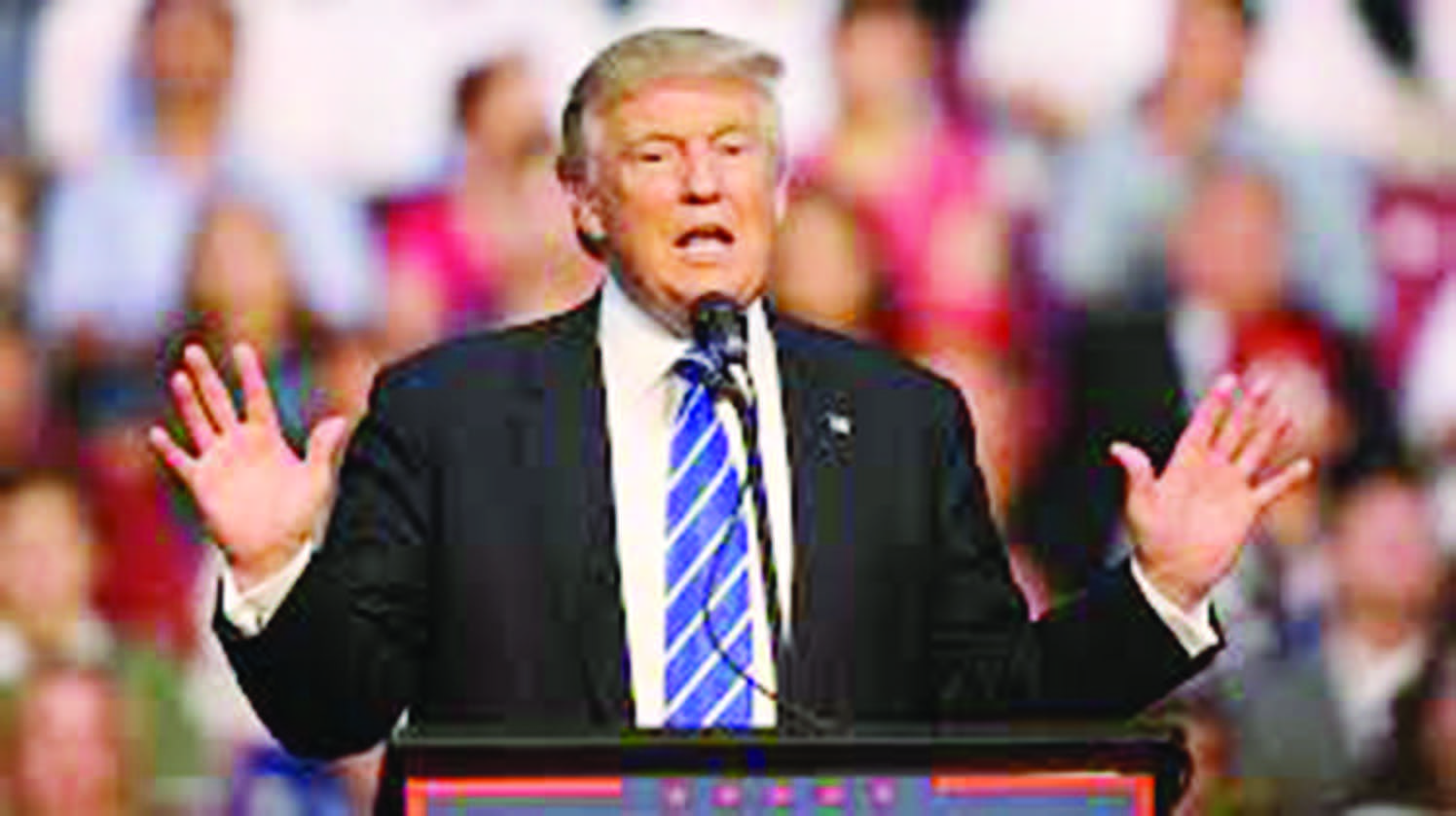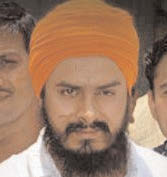
On Thursday, August 11 morning, Donald Trump doubled down on his latest verbal outrage: the claim that President Obama was the “founder” of ISIS Actually, the Republican Presidential nominee tripled down. Appearing on CNBC’s “Squawk Box,” he described himself as “a truth teller” and went on to say that the President was “the founder of ISISabsolutely, the way he removed our troops.” Referring to Hillary Clinton, Trump added, “I call them co-founders.”
Peripatetic as ever, Trump gave another interview, a short time later, to Hugh Hewitt, the conservative radio host, who said to him, “Last night, you said that the President was the founder of ISIS. I know what you meant. You meant that he created the vacuum, he lost the peace.”
Trump wasn’t having it. “No. I meant that he’s the founder of ISIS,” he said. “He was the most valuable player. I gave him the Most Valuable Player award. I give her”-Clinton-“too, by the way.” Hewitt evidently thought that this was unfair to Obama. “But he’s not sympathetic to them,” he said. “He hates them; he’s trying to kill them.” Trump was unabashed. “He was the founder,” he said, referring to Obama. “His, the way he got out of Iraq, that was the founding of ISIS.”
What are we to make of all this? At this stage, some will argue that it isn’t worth the effort to interpret Trump’s misstatements, or to point out the truth of the matter-in this case, that a Jordanian named Abu Musab al-Zarqawi founded ISIS, in 2004. At the very least, it should be obvious to everyone by now that Trump doesn’t deal in reality; he deals in mythmaking, demagoguery, and carnival barking.
When he’s not tied to a teleprompter, Trump often seems to say the most provocative thing that comes into his head, with little thought for the consequences for his campaign, or for the campaigns of other Republicans. He’s like a small child, trying to be the center of attention, even if that means he has turned himself into an object of outrage and ridicule.
If you take this view of Trump, there isn’t much more to be said. He’s the melting figure on the cover of this weeks’ Time magazine: a reality-television shyster who somehow captured the nomination of a major political party and is now dissolving in front of us. The only remaining questions for you are how big a majority Clinton will rack up, and whether the Republicans can limit the damage in the Senate and the House of Representatives.
I’ve got a lot of sympathy for this interpretation. But, just for the sake of argument, let’s assume that Trump is smarter and less myopic than he seems. Let’s assume that what he’s really focused on isn’t winning this year’s election, a task he now realizes is beyond him, but creating a long-term Trumpian movement. A nationalistic, nativist, protectionist, and authoritarian movement that will forever be associated with him, but which also has the capacity to survive beyond him. A movement that in some ways would resemble other right-wing political parties around the world, such as France‘s National Front, Austria‘s Freedom Party, and the U.K. Independence Party, but which would also harken back to earlier moments in American history, such as the rise of the anti-immigrant Know Nothing movement of the eighteen-forties, and the formation, a century later, of the isolationist America First Committee, which sought a negotiated peace with Hitler.
If establishing such a following, and bringing about a historic realignment on the right, was Trump’s real intention-rather than moving into the Oval Office next January-some of what he has been saying lately would be more comprehensible. Not more accurate or less odious, but more explicable on its own terms.
History tells us that for right-wing populist movements to succeed, a number of things need to be in place. For one thing, they need a narrative that mainstream political leaders, and political parties, are guilty of not merely incompetence but betrayal. The most notorious example is the “stab-in-the-back” myth, widely believed in Germany after 1918. That narrative held that the German military didn’t really lose the First World War; the soldiers were betrayed by traitorous civilian politicians who signed an armistice. Later examples include the conviction in French conservative circles, during the nineteen-sixties, that Charles de Gaulle, in giving up Algeria, had betrayed France, and the accusation, thirty years later, that François Mitterrand and other French leaders had turned their backs on la Mère-Patrie by supporting the Maastricht Treaty, which created the European Union.
Trump has been arguing for months that the Obama Administration, in withdrawing almost all U.S. troops from Iraq, helped bring about the conditions that enabled ISIS to seize territory and create a self-styled caliphate. (He fails to point out that the Bush Administration initiated the troop withdrawal.) He first suggested that Obama and Clinton created ISIS seven months ago, long before this week’s comments. At a rally in January, he said, “They’ve created ISIS. Hillary Clinton created ISIS with Obama.”
At the time, Trump’s comments attracted some attention and criticism, but not very much. His principal adversaries then were his rivals in the Republican primary, and there was something of a competition going on to demonize Obama and Clinton. In returning to this sort of language now that he’s got the nomination-and escalating it with his use of the phrase “founder of ISIS”-Trump is, on the face of it, harming his prospects for November. He certainly doesn’t sound like he’s trying to win over the soccer moms in Columbus, or the office workers in Tampa, that he needs to win the election. He sounds like he is talking to his angry base, and supplying them with an inflammatory narrative that can be trotted out for years, and decades, to come. It’s a tactic that politicians outside the United States, such as Jean-Marie Le Pen and Jörg Haider, have used to good effect in building up far-right nationalist movements.
Then there are Trump’s increasingly frequent references to the likelihood of his losing in November, and to the possibility that foul play will be responsible. “I’m afraid the election’s gonna be rigged, I have to be honest,” he told a rally in Ohio, on August 1st. A day later, talking to Fox News’s Sean Hannity, Trump returned to the theme, saying, “I’m telling you, November 8th, we’d better be careful because that election is going to be rigged. And I hope the Republicans are watching closely or it’s going to be taken away from us.”
It is, of course, a staple of extremist parties of the left and right that democracy is a sham, and that elections count for nothing. And once you have delegitimized an election result, or an elected leader, you can justify all sorts of extra-electoral, and indeed anti-democratic, actions.
In the wake of Trump’s remarks, some commentators pointed this out. “Suggesting an election is going to be stolen, this is Third World dictatorship stuff,” CNN’s Brian Stelter said. “The problem for Trump is that his supporters believe what he says,” Vox’s Dara Lind wrote. “If he says a Trump loss means the election has been stolen, there are millions of people prepared to believe it.” Just as there are many people who are willing to believe-or to internalize and accept, anyway-that Obama created ISIS, even though it was founded four years before he came to office.
So is this what Trump is up to-diligently seeking to create an enduring America First movement that will eventually supplant the Republican Party? I wouldn’t give him that much credit. He’s precisely the self-centered, shortsighted, and insecure figure he appears to be, and he’s now flailing around for excuses to explain a humiliating defeat in the making. In his interview with CNBC, he said, “If, at the end of ninety days, I’ve fallen short . . . it’s O.K. I go back to a very good way of life.”
But even if Trump is just along for the ride, that doesn’t excuse what he is doing. Four years from now, or eight years from now, a more disciplined and self-controlled figure could take up where he left off. If at that time the United States were facing a serious economic or national-security crisis, more Americans-conceivably even a majority of them-might be willing to accept the argument that regular politicians have failed and betrayed them, and that drastic measures are called for. Healthy democracies don’t decay overnight. They gradually rot from within, with termites like Trump undermining their foundations.
(Source: newyorker.com)




Be the first to comment